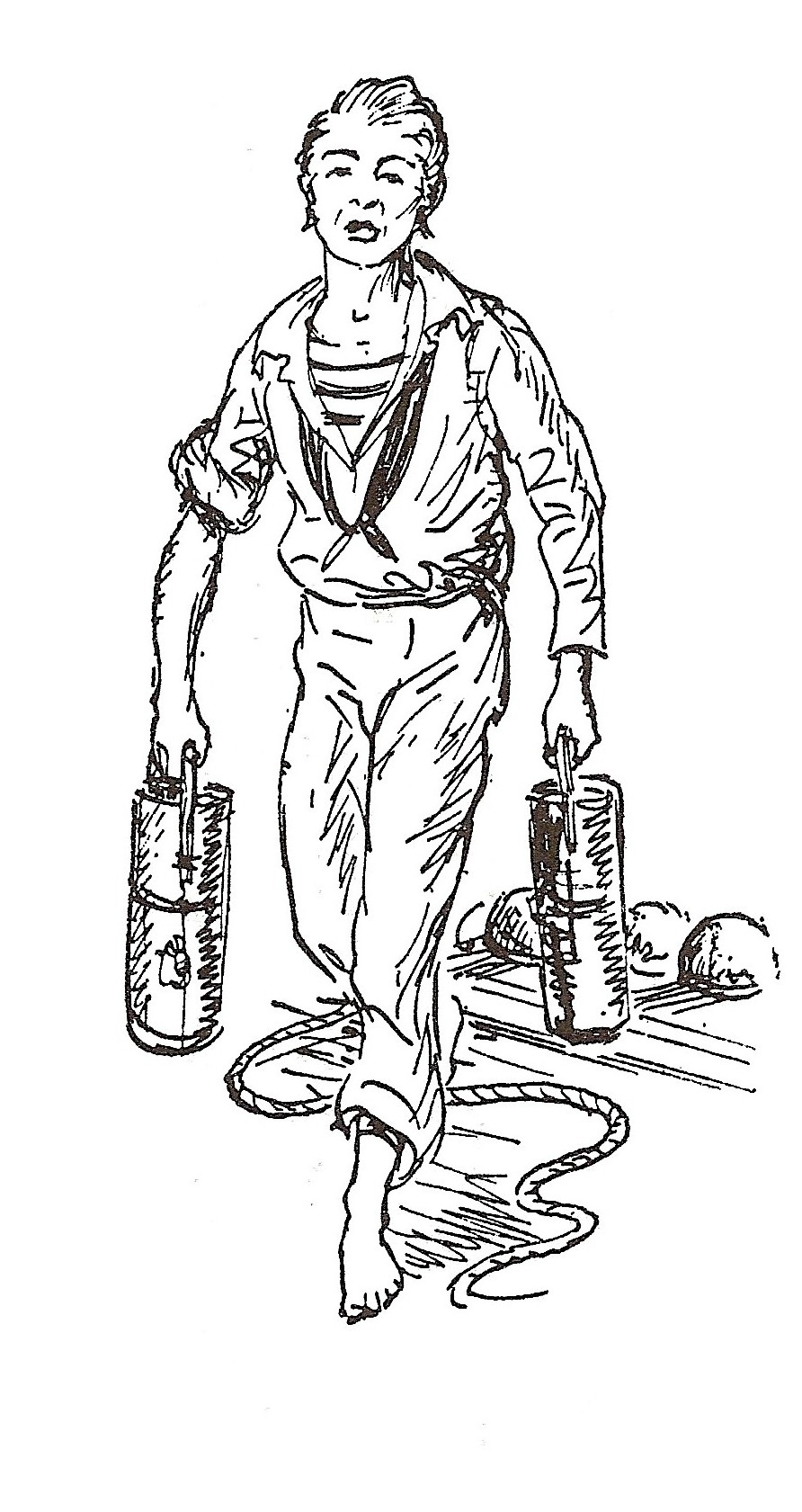« Intelligent design - or survival tactics? | Main | Trying things on again! »
March 07, 2007
Menagerie afloat?
In the course of a conversation with someone who is reading my book at present, it struck me that, unless you are familiar with some of the names, titles and terms of reference in England's famed "Wooden Walls" Navy, it could easily be thought that many ships had a menagerie on board. The most obvious one is the "Powder Monkey", a boy aged between about ten and fifteen years (At fifteen they were old enough to be "Rated" as a "man") who carried the cartridge cases from the magazines to the guns during battle. Each boy carried two cartridge cases, each containing a canvas "cartridge" and containing in each up to eight pounds of gunpowder, the charge required for the 32 pounder guns mounted on the lowest deck of a three decker. As each gun fired at least twice in every minute and a half, the boys had to run back and forth and, as anyone who has visited HMS Victory will know, the magazines are well below deck and would not have been lit during a battle for fear of fire!

A Powder Monkey with his cartridge cases from the time of Trafalgar. The artist has depicted a youth in his mid teens and given him a uniform, most were dressed in modified caste-offs from the seamen and would have been a lot younger! Behind him can be seen a "Shot Garland" sitting in a Brass Monkey.
Another "monkey" to be found on shipboard in those days was the "Brass Monkey" - a brass plate caste or drilled with holes in it to allow the ready use cannon "shot" to be kept on deck next to the guns. The bulk of the iron shot would have been stowed low down next to the magazines and again the boys had to run back and forth to maintain a supply of shot to the guns. The shot kept on deck sat in the circular opening in the brass plate and could be displaced during heavy weather, so it was generally secured in place with a canvas cover. However, in very cold weather the differential rate of expansion and contraction in brass and iron meant the balls could be squeezed out of their openings. Hence the expression "Cold enough to freeze the balls of a brass monkey".
In a recent short story soon, I hope, to appear on Amazon.com I have made mention of the stench that pervaded these ships when they were in commission. Again, I have been asked to explain, so here it is.
A 74 gun ship of the line needed a crew of almost 800 men and officers to handle sail and guns. Even so, she could only effectively fight one broadside or the other, not both at the same time, althiough, in extremis it could be done, but at a very reduced rate of fire and very inefficiently. A 32 pounder gun needs sixteen men to serve it, most of them required to "run it up" into a firing position, and the smaller 24 and sixteen pounder guns required proportionately similar numbers. The exception was the huge Carronade, a very short barreled weapon which fired a hollow caste iron ball filled with musket balls and which burst into shrapnel on impact. Victory has two 64 pounders and most 74's carried two or four 32 pounders on the f'o'c'sle. These needed a relatively small crew, but were also very short ranged - althougfh absolutely devastating if they hit. The French referred to them as the "Devil's gun".
Now, pack 800 men into a ship a little shorter than a modern frigate. Remove all thoughts of modern plumbing. The officers washed in basins of tepid water (assuming they washed!) and used a "Commode" as a toilet. So did the Captain and the Admiral. The crew lived mostly on the lower gun deck, each man assigned to a "Mess", a table slung over one of the lower battery guns and slept in a hammock slung fore and aft above it. Each man was allowed six feet length and 15 - 18 inches width. Washing facilities - none bar the deck wash pump. Toilet facilities - the "Heads" two small enclosed spaces with a crude open seat on the beakhead on either side of the bowsprit. In rough weather, not the place to be, so other places, quite commonly the bilges or the scuppers, could be used to relieve oneself - provided you weren't caught doing it! Now add to the stench of 800 men - largely unwashed (and none of this modern fancy deoderant stuff either thank you!) the smell of cooking salt beef or pork and the galley fires, the animals kept in pens on the upper gundeck (and doing what they do to relieve themselves ....) the occassional slaughtering that had perforce to be done on the same deck, and you have a smell that would probably poison the modern nose out of existence within minutes.
They bred them tough in those days. The adage that they were iron men in wooden ships probably extended to their stomachs as well. You don't even want to think about what their water or their meat looked like or tasted of!
Posted by The Gray Monk at March 7, 2007 08:06 AM
Trackback Pings
TrackBack URL for this entry:
http://mt3.mu.nu/mt/mt-tb.cgi/4949